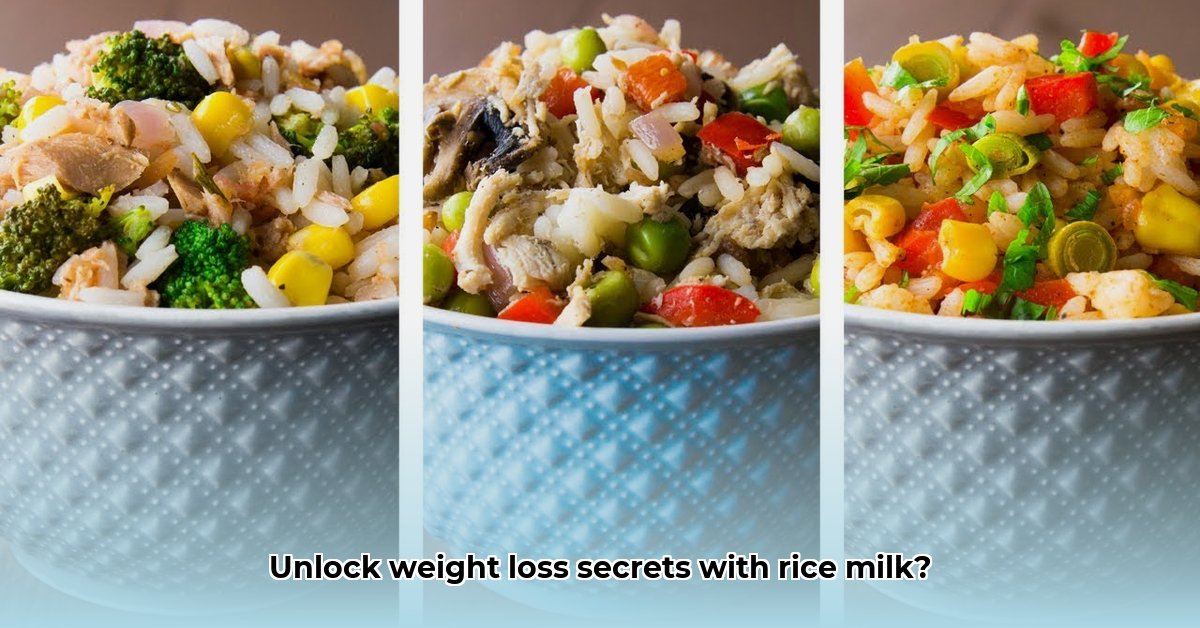
Rice milk, with its creamy texture and mild flavor, is a popular plant-based alternative to dairy milk. Many wonder if it can aid in weight loss. While rice milk alone won't lead to significant weight reduction, it can be a helpful component of a balanced weight-loss plan. This guide will explore how to incorporate rice milk effectively, while highlighting its limitations and offering alternatives.
Understanding Rice Milk's Nutritional Profile
Before integrating rice milk into your diet, let's examine its nutritional content. A typical one-cup serving contains approximately 115 calories, with a low fat content of around 2.4 grams. Protein is relatively low, typically around 0.7 grams per serving. The carbohydrate content is moderate, and many brands are fortified with vitamins and minerals like calcium and Vitamin D. However, its nutritional profile varies significantly depending on the brand and whether it's sweetened or unsweetened. Always check the nutrition label for accurate information. Can you think of any other dairy alternatives with a similar calorie count but higher satiety?
How Rice Milk Can Assist Weight Loss (in a balanced diet)
Rice milk's low calorie and low-fat content can be beneficial for weight management when used strategically. Replacing higher-calorie beverages like soda or juice with unsweetened rice milk can contribute to a calorie deficit, a crucial element of weight loss. For example, swapping a sugary soda for rice milk can save you hundreds of calories over the course of a week. What other practical substitutions can you make to minimize unnecessary calorie consumption?
However, it's crucial to understand that rice milk alone isn't a weight-loss solution. Sustainable weight loss requires a holistic approach combining a balanced diet, regular exercise, and a calorie deficit. Rice milk's low protein content also necessitates careful attention to ensuring sufficient protein intake from other dietary sources, such as lean meats, beans, lentils, or tofu, to support muscle mass and satiety. How can one ensure adequate protein intake while incorporating rice milk into a weight-loss regimen?
Incorporating Rice Milk into a Weight-Loss Meal Plan
To effectively use rice milk for weight loss, follow these steps:
- Choose Unsweetened Varieties: Avoid added sugars, which significantly increase calorie content.
- Strategic Substitutions: Replace sugary drinks with unsweetened rice milk.
- Creative Culinary Uses: Incorporate rice milk into smoothies, oatmeal, or as a baking ingredient for added creaminess without significantly increasing calories.
- Boost Protein Intake: Pair rice milk-containing meals with protein-rich foods to compensate for its lower protein content. This will keep you feeling full and satisfied for longer.
Potential Downsides and Alternatives
While rice milk can be part of a healthy weight-loss strategy, it has limitations. Its low protein content is noteworthy. Also, some brands contain significant amounts of added sugars, negating any potential calorie benefits. Individuals with rice allergies should avoid it completely.
If a higher protein content is desired, consider alternatives like almond milk, soy milk, or oat milk. These offer comparable calorie counts but frequently boast higher protein content.
Frequently Asked Questions (FAQ)
Q: Will drinking rice milk help me lose weight? A: Only as part of a comprehensive weight-loss plan that includes a calorie deficit and regular exercise. Consuming rice milk alone will not likely lead to significant weight loss.
Q: Is sweetened or unsweetened rice milk better for weight loss? A: Unsweetened rice milk is always the superior choice for weight management due to its lower calorie and sugar content. Added sugars significantly impact overall calorie intake.
Q: How much rice milk should I consume daily? A: The appropriate amount depends on your individual calorie needs and overall diet. Consulting a registered dietitian or nutritionist is recommended to determine the ideal intake for your specific goals and dietary requirements.
The Big Picture: Sustainable Weight Management
Sustainable weight loss is a holistic journey focusing on balanced nutrition, regular exercise, and mindful eating habits. Rice milk can be a helpful tool when used strategically within a broader plan. Always prioritize a well-rounded approach that incorporates healthy food choices and physical activity for optimal weight management. If you have any health concerns or specific dietary needs, consult a healthcare professional or registered dietitian for personalized guidance.
Key Takeaways:
- Rice milk is not a weight-loss miracle; it's a supplementary element within a balanced approach.
- A calorie deficit is essential for weight loss; rice milk can contribute to this goal within a comprehensive plan.
- Always choose unsweetened varieties to minimize added sugars.
- Rice milk's low protein content demands attention to other protein sources within your diet.
- Consistency and a holistic approach are crucial for long-term weight management.